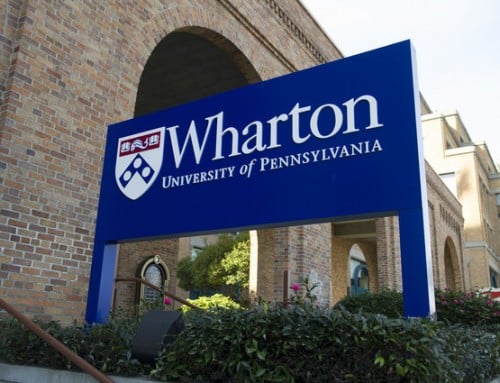Wharton Business School is one of the leading business schools in the US and in the world. Its MBA program is constantly ranked at the top of all major MBA rankings. ARINGO conducted a short interview with William Houder, Associate Director of Admissions, to learn more about Wharton and its MBA program:
Q: What is special about your MBA program? In addition to its’ excellent reputation, what differentiates it from other Top MBA programs?
A: The Wharton MBA is special because of the personalization provided to our students and because of the large and accessible network. Our curriculum emphasizes an intensive, flexible core in general business education, plus the depth of 19 majors and breadth of nearly 200 electives. From a curricular perspective, this wide variety allows the Wharton MBA to be tailored to individual and makes the experience one that, whatever a student’s aspirations are, will provide them the tools they need to develop. It’s this environment that also creates a dynamic community and ultimately, allows students to foster relationships as they join the largest alumni network of any business school.
Q: Are there any recent changes in the programs or in the admission process?
A: We’ve recently announced the new Quantitative Finance major, which includes cross-disciplinary course content from accounting; statistics; and operations, information and decisions. The major will appeal to students with strong quantitative backgrounds in a variety of subjects, such as engineers and computer science majors, who aspire to develop their skills for quantitative applications in finance. Students in the major will hone their technical expertise and leadership skills. They will emerge well-prepared for a wide range of careers in the financial industry, including quantitative asset management and trading, financial engineering, risk management, and applied research. The Quantitative Finance major is Wharton’s sixth STEM designated major (can allow for STEM OPT extension). Additionally, we recently developed an internship track within the curriculum that would allow for CPT.
Q: Has the COVID-19 situation have an impact on getting accepted to the programs at your school? Is there any other impact candidates should be aware of?
A: No, COVID-19 has not impacted student’s acceptance into the Wharton MBA program; however, it has changed how prospective students can get to know us. While we aren’t able to invite candidates to visit us on campus or around the world, we are able to connect with more candidates virtually as we offer more webinars and use more digital tools to answer questions live.
Q: Can you share some details about the atmosphere in the school? Amongst the students? Between students and faculty? How do students spend their free time?
A: Wharton is the second largest MBA program, with about 864 students in each class. While this is a big place, we’re really mindful about making each class feel like a small community. The largest class a student will take will be limited to no more than 72 students, and there are many opportunities for students to engage with each other and faculty, putting the skills learned in the classroom to work in clubs, conferences and research opportunities.
Q: Can you share some details about the area the school is located in?
A: Wharton is located in the University City neighborhood of Philadelphia, a large neighborhood where four other universities are located. The city of Philadelphia itself is the 6th largest city in the United States, but at just 150 square miles, it’s easily commutable by bike, public transportation or, in many areas, by foot. it is the kind of city where you feel like a local after your first week. It’s walkable, affordable, big enough but no too big, and rich in culture and diversity. Wharton also takes advantage of a student life office and programming space in the city center, which is closer to where the majority of MBA students live during the program.
Q: What is it that you are looking for in a candidate? Who will especially enjoy this school? who will be a good fit to the school?
A: We seek to enroll a diverse class each year, representing different professional and personal experiences and interests, varied global exposure and citizenships, and numerous identities and backgrounds. For all candidates who apply, we are looking to learn about their achievements and promise in the MBA classroom, Wharton community, and their future career. We encourage candidates to reflect and articulate in the appropriate parts of their application their abilities and potential in those three areas.
Q: Are later rounds worth considering?
A: Absolutely! We strongly advise candidates who know they are ready to apply to submit their application in the first and second round. Space in the class becomes more limited for round 3 applicants, resulting in more competition. For those applicants interested in our JD/MBA or join MBA/MA Lauder degree in International Studies, application are only accepted in rounds 1 or 2 due to program start dates.
Q: GMAT and importance as a % of the candidacy? What is the minimum GMAT you are looking for?
A: There is no minimum GMAT score. Our office’s admissions philosophy is “read to admit” – GMAT or GRE scores are used alongside college academic achievement and rigor, among other factors, to assess a candidate’s ability to be successful at Wharton.
Q: Is there anything you’d like our candidates to know regarding the admissions process?
A: Our read to admit philosophy as an office means that we focus on identifying and building upon the greatest strengths in each candidate’s application. As a candidate, you cannot expect to be perfect across all areas; highlight and develop the skills and knowledge you have and share how your experiences and goals can align with the Wharton MBA.
Q: Can you tell us more about funding – scholarship/fellowship options in your school?
A: Every applicant is considered for merit-based fellowships and no additional application is required for any of our fellowships. There are some other funds beyond those given during the admissions process that can be attained during the first and second year of the MBA, including need-based student experience funds.





Leave A Comment